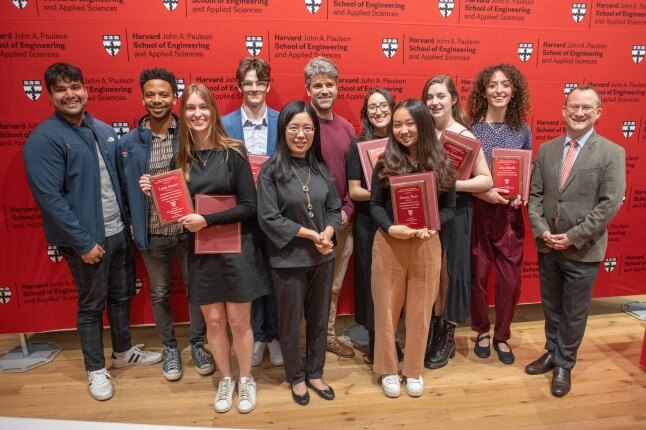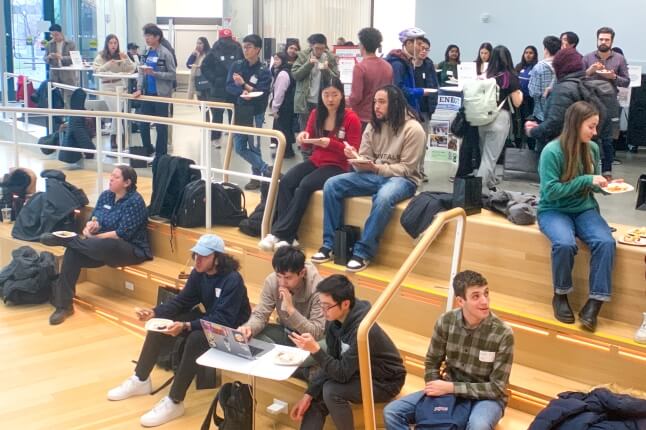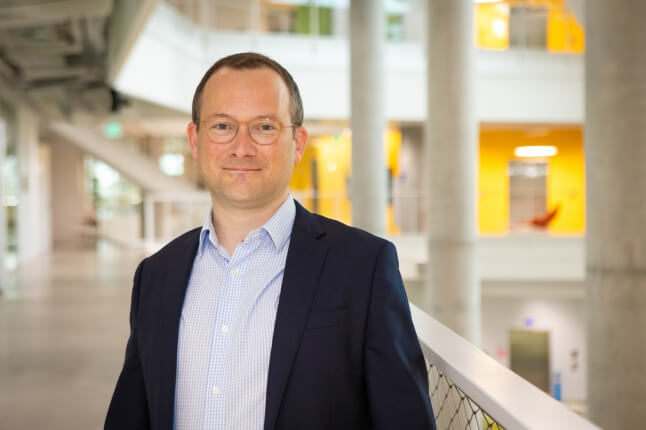News
David Parkes, the George F. Colony Professor of Computer Science, stepped into his role as the John A. Paulson Dean of the Harvard John A. Paulson School of Engineering and Applied Sciences (SEAS) this week.
We sat down with Dean Parkes to talk about his vision for the future of SEAS.
Q: What is your vision for SEAS?
Parkes: Harvard's a unique place. I think about engineering as the thing that is in the middle between the sciences and society. I think about engineering as that bridge between the things we discover and the things that we need, and Harvard's engineering and applied sciences school is the perfect place to be what that is, in the middle, because we have the applied sciences that connect what we do to the sciences. We have the sciences really nicely embedded within the school, and then we have the breadth and the richness of the social sciences, and the humanities, and the professional schools to make sure that the engineering that we're doing connects in the right way to society. I don't know of any other engineering school in the country, probably in the world, that has that richness of opportunity - that flows into the sciences and that flows into society, through our connections with the rest of the University. I think that, for me, is an incredible thing and makes us very special. The word engineering actually derives from Latin for ingenuity or cleverness, and the engine is the product of ingenuity. Another way to say this is that I want for us to be the engine for Harvard. I want us to be the cleverness that sits in the middle that finds solutions to today's problems.
The other thing that motivates me are two grand challenge areas. The grand challenge area of AI, and everything that involves the technology and the contextualization that is so important, coming from society. The power to do good through AI, but the perils if we don't get it right. Harvard SEAS needs to be in the middle of that conversation. This is our role to play at Harvard, and more broadly around the world. Climate and sustainability is the other big challenge. We have to be playing a role within the school in providing new technology to let us live more sustainably. And again, it's a perfect “one SEAS” research and teaching agenda. Because the technology related to sustainability needs to also connect in the right way with economics, with markets, with the way we live. And that, for me, is a driving call for what we need to be doing within the school.
Q: What does leadership mean to you?
Parkes: So when I was at Penn, I was on the bike team. And at some point, I became the captain of the road bike team. And it wasn't because I was the best cyclist. I did win one race once. But I was the captain because I was trusted. In that case, I was trusted to be able to drive the bikes around. That was my role. I was a graduate student and they thought that I wouldn't get into accidents. And I didn't.
I think that does get a little bit too what leadership is about. One part of leadership is trust. I think it's so important that the community at SEAS sees me as somebody who wants the best for the school, and sees me as somebody who can effect the change that we need by working collaboratively with the right stakeholders, whoever they be within our school or in other schools around the University or in places outside of the University. Because we need to be activating industry opportunities - the Enterprise research campus I referred to earlier. There are all these things that as a leader you need to be doing. You cannot get any of these things done if people don't trust you. So for me, that's the place where I always start. What does that entail? I think it means transparency, and the way that you deal with people, and I think it means respect in how I interact with everybody else within the school, and also the respect that I expect each of us to show for each other as well.
Q: How can Harvard SEAS help address the societal changes presented by new technologies?
Parkes: The way I think about technology and society is that I start from the viewpoint that humankind has an insatiable thirst for doing more. We've always wanted to do more. We've always had great ambition as a species and technology has allowed us to do that. Technology has existed in serving humankind to be able to do more; to be healthier; to have better access to food; to have better access to healthcare; to travel; to understand our world; to build and design and enjoy new things. So technology has brought a lot of good. It is the thing that we have that serves society and enables us, and yet we can feel the tension. We also recognize that the way we're acting today through technology is not sustainable. We know that we are hurting our planet. We know that, and what that means is it that we need to use technology to be able to keep satisfying our thirst, as a world, for doing more. But we need to find ways through technology to provide that - to allow us to do what we want to do, and to do things we can't even imagine doing, but to do that in a way that is not leading to the climate crisis we have today. We need solutions, and those solutions are going to need to come from technology. I think it's an envelope expansion. I don't think it's about having people do less. I don't think that's going to work. It's about allowing us to do what we want to do, but to do so in a way that is truly sustainable. That's what I'm passionate about. I'm passionate about finding a way forward through technology.
Q: Why is building an inclusive community important to you?
Parkes: Universities are places without barriers. They are places where people who have the most passion, the most aptitude for learning, for the generation of knowledge - can participate in and can work together collaboratively, to advance themselves, and to advance what we need in our societies. For universities to function that way, everybody has to feel that they belong, and belonging is what I mean when I say community. It's belonging that leads to community. It's belonging that is about having people feel included. It's about having everybody feel that they have a voice. And one thing that has really stuck with me is I had the pleasure of teaching a class to graduate students in the computer science program, and a Black student in the class described the challenge of every time he needs to speak to an audience he has to win the respect of the audience. You have to win their respect because of the color of his skin. It's an unacceptable burden on people in our community, whether because of the color of their skin, their gender, or other things about who they are. It's unacceptable that they carry that burden. So it's on all of us to recognize these differences, and to speak out when we see things that are not right, and to try to help each other to be as amazing as we can be as individuals, and to do that collaboratively. So for me this is what community is all about. It's about recognizing our differences, and having everybody feel welcome and that they truly belong.
Check out our Youtube page to hear more of our conversation with Dean Parkes.
Topics: Dean
Cutting-edge science delivered direct to your inbox.
Join the Harvard SEAS mailing list.
Press Contact
Leah Burrows | 617-496-1351 | lburrows@seas.harvard.edu


